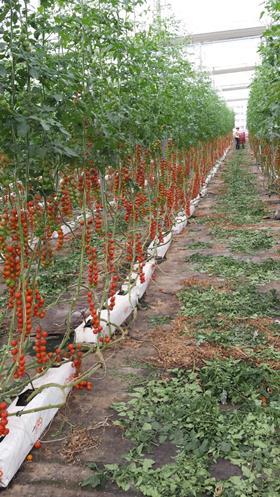
Their island location has both pros and cons for salad suppliers based in the Canaries. While the temperate climate offers an invaluable source of winter salads, better even, some claim, than competitors Morocco and Spain, the islands’ isolation means energy and water costs are much higher.
To counter this, tomato grower Cortes has so far invested €3 million (£2.2m) into its speciality tomato production, as a premium product that can demand a higher prices and therefore go some way to compensating for higher input costs. Managing director Hernan Cortes explains how his company’s drive into the specialty tomato market began with investment into better structures, with production based on the south coast of Gran Canaria.
“We have 10 hectares of specialty cherry on-the-vine tomatoes, after a continuous investment over the past two to three years,” he says. “Our drive in specialty tomatoes began when we started buying land and building structures. We’ve got another four hectares to be built over the winter that will take the total to 14ha, and we will see how that goes before expanding further.”
Cortes says the company is producing a range of different coloured baby plum tomatoes, including a tiger baby plum due for January picking, and a large-scale trial of an orange variety in its first-year of production and that is due for picking this November. He says: “UK multiples like the fact we’re growing under better-quality structures. We export as an alternative to mainland Spain and Morocco, and we have a better climate than both of them, in my opinion. In addition, specialty tomatoes aren’t really on the map for the local markets, so we also see an opportunity there.”
Jose Hernandez, managing director at fellow Canary Islands tomato grower Fortuna Frutos, says investing in more modern growing structures allows the company to trial a “vast range of tomatoes within all types and specialities”.
Fortuna Frutos currently has 80 per cent of production under new structures, and within the next two years Hernandez expects this to become 100 per cent. “Considering loose round fruit is now a conventional product, we would like to make a point of difference from other sources,” he says. “We grow standard loose round tomatoes, mainly Mariana and Dorothy varieties, with a large trial for this forthcoming season of a variety called Marinova. All these varieties are grown with the idea of enhancing flavour, and better sugar brix levels with generally medium-sized fruit. Besides that, we grow vine and the speciality baby plum Angelle, again with very high sugar brix content.”
Supplying into retail, foodservice, processing and wholesale, Hernandez says Fortuna Frutos’ first arrival is due into the UK this week – almost two weeks earlier than last year. “The main issue remains the logistical cost of shipping the fruit not only to the UK but to the rest of northern Europe. We still remain at a disadvantage in relation to the freight cost other countries have, which is significantly cheaper and with the possibility also to go direct to customers from source.”
In addition, Hernandez says that the internal cost of onwards distribution in the UK is not translated back to euros for growers, as it is transacted in sterling, meaning that costs are further affected by exchange rates. “Nevertheless, we as a group of growers are very passionate about what we do and firmly believe in the future,” he adds. “We have many different generations still in the business and despite the difficulties we remain positive. With the history of our premium Canary tomatoes in the UK, we are determined to keep that presence alive for many years to come.”
Strong start to season
A strong start is expected for the forthcoming Canary Island tomato and cucumber campaign. Andrew Zerpa-Falcon of Victoria Trading says planting is on schedule and the first arrivals were expected in mid-October, around two weeks earlier than last year when the season was running late.
“Both the tomato and cucumber crops are extremely healthy: the weather has been mild and quality is expected to be very strong,” he notes, adding that overall volumes will be similar to last year, with most production being grown to satisfy programmed orders.
Productivity on the islands continues to improve as a result of ongoing investments to replace older greenhouses, according to Zerpa-Falcon, while varietal trials are also starting to deliver.



